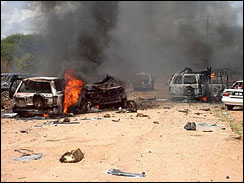fiogf49gjkf0d
by Muuse Yuusuf
Sunday, June 21, 2009
|

Baidoa: first ever suicide car-bomb
|
The suicide bombing in Beletweyne that killed the security minister, Omar Hashi is not the first of its kind in Somalia’s current political turmoil, in which hardliner “Islamists” had tried to eliminate a prominent member of a Somali government. Also, the latest attempt to topple the National Unity Government “TFG-II” in Mogadishu is not the first of its kind.
Let us look back at recent history. It was September 2006 when in Baidoa a suicide bomber failed to assassinate colonel Abdullahi Yusuf, former president of the Transitional Federal Government (phase I). It was also in the same year when hardliner “Islamists” had tried to overthrow his government. Add to this, the assassination attempt on former primer minister – Prof Ali M Ghedi in 2007.
At the time, the suicide bombers were believed to belong to Al-Shabaab, Islamic Courts Union’s military wing, which now seems to be running the show. At the time Baidoa was besieged, and the talk in the town was Baidoa will be taken over by ICU forces, and that the then government will be swept away from power.
However, ICU forces, which the current president was its executive leader failed disgracefully, and the government survived mysteriously and puzzlingly!
Looking back, one could argue that the ICU probably failed in its attempt to topple that government because it had committed a fundamental strategic error. Its strategists mistakenly misjudged and underestimated their enemy’s power. ICU strategists thought that they could make the TFG surrender at its base in Baidoa. However, although the TFG was militarily weak and not so popular, that government, however, protected itself by securing the support of forces of war on terror. The leadership coordinated its plan for survival with their masters in Addis Ababa, and succeeded in convincing IGAD, AU and USA the need for the deployment of foreign troops in Somalia.
Consequently, Ethiopia invaded Somalia, and ICU forces and its leadership were chased out of southern Somalia.
They say history repeats itself, and what is happening in southern Somalia right now is more or less a second phase of what had happened in 2006. Here we go again. There is a weak government, which is again supported by the international community – IGAD, EU, UN, Arab League and your name it. And to be fair, this government is more popular among Somalis than the previous one. It enjoys some legitimacy – whatever that means in Somalia’s current political dictionary - because the current parliament is a marriage of convenience between members of the previous parliament and members of the opposition groups – the ARS Djibouti wing.
Again, the government is under siege by an alliance of groups, namely “Al-Shabaab” and “Xisbul Islam” – whatever the term “alliance” means in Somalis’ notoriously shifting and changing alliances and allegiances. These groups are determined to bring down the government, which they see full of turncoats and traitors. The flames of war were set off by the arrival of Hassan Dahir Aweys - a colonel-cum-cleric-cum-warlord in Mogadishu in April 2009. The only difference this time is that the protagonists are old friends who were once members of the now defunct ICU – who are fighting for the control of the South of Somalia.
So far the armed opposition groups “Islamists” seem to have failed to overthrow the government, and the government to be surviving. The latest suicide bombing in Beletweyne is probably an act of desperation similar to what had happened in Baidoa 2006.
Therefore, the question is whether the opposition groups are again making the same strategic error as the ICU made in 2006 by underestimating the government’s power and misreading the international community’s determination in supporting whatever form of government that is in Somalia?
The other one million question is, taking into consideration of failed military interventions, including Ethiopia’s adventure in Somalia, what kind of action would the international community take in order to help bring peace and stability in Somalia?
Only time can tell!
Muuse Yuusuf
[email protected]